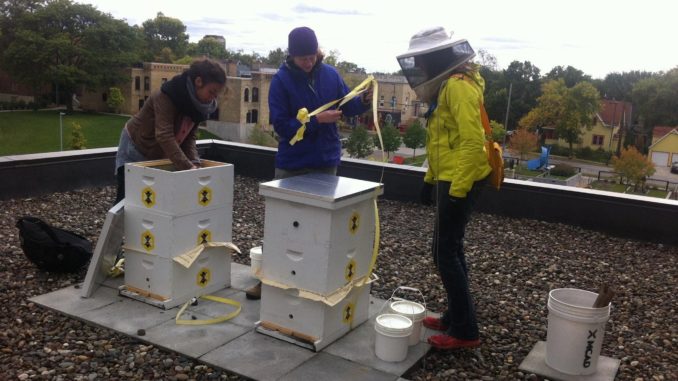
One of the things Bridget Mendel Lee does as a beekeeper and teacher is help people get comfortable enough to work with honey bees without wearing protective gloves. She finds most people with intense phobias tend to not want to learn about beekeeping, but she still wants to ease anxiety about getting stung.
“I get that,” Mendel Lee said. “I’m afraid of needles, and no one has been able to get me past that fear. If your main goal is not getting stung, you’re going to be a bad beekeeper.”
The relationship between humans and bees is one of the topics in a talk Mendel Lee will give at Truman State University, along with the ways in which people can help bees and the environment.
Mendel Lee started keeping bees while she was attending Northwestern University as an undergraduate. She was a gardener and wanted to understand the pollinator side of plants. She was also interested in honey bees because they are found in art, mythology and poetry. There was no specific moment when she realized she wanted to work with bees. She was just very sure about it, even before she first opened a colony.
Mendel Lee’s daily life as a beekeeper is unpredictable.
“You are working with an animal that’s not really domesticated and not totally wild,” Mendel Lee said. “So you’re always being surprised; you’re always learning. The most consistent parts of the job are that you are always dirty and sticky.”
While Mendel Lee knows some beekeepers who don’t like honey, she never gets sick of it. People like to bring her honey from their travels. She said tasting different honey is a fun way to learn about a particular place and its floral landscape.
Mendel Lee has a Master’s in Fine Arts in nonfiction from the University of Minnesota. She is not interested in deciding what genre her work fits into and lets readers make that decision. She writes about bees because it is something she knows deeply. She said she likes thinking about bees, and bees help her understand relationships between species and the environment. She also teaches creative writing at the Minneapolis College of Art and Design. Hybrid creative work is one of the topics she explores with her students. She likes artists and writers who are interested in playing with form. Bhanu Kapil and M. NourbeSe Philip are examples of writers she uses in class.
“I feel like my students already know how to write narrative stories —they’ve been consuming these narratives their whole lives,” Mendel Lee said. “So I try to introduce them to other structures, experiments or other ways of telling.”
Mendel Lee is a program manager at the University of Minnesota Bee Lab’s Bee Squad. She said her job is a mix of taking care of bees and developing and running bee squad programs and meetings.
She teaches and manages the interdisciplinary, pollinator-focused programs such as Bee Arts and the HMR Pollinator Project. Additionally, she writes grants and communications for Bee Squad’s programs and research projects.
“Everything I do is about helping pollinators, and working with people so that they get invested and feel empowered by helping pollinators too,” Mendel Lee said.
Mendel Lee is also the recipient of the University of Minnesota Book Arts Fellowship, Block Arts Fellowship and a Minnesota Emerging Writers Grant. She said the money helps her so she can pay herself to write, travel and conduct research.
As an educator, she works to dispel misconceptions and educate people about taking care of bees. A common misconception Mendel Lee comes across is people assume there are only a few bee species out there, such as honey bees and bumble bees.
“Really, there are about 20,000 species of bees in the world,” Mendel Lee said. “And most of them are solitary bees. There’s a huge diversity of bees out there.”
To learn more about beekeeping, Mendel Lee will give a talk at 6 p.m. Monday, April 1 in Baldwin Hall 114. Some of the topics include the ancient relationship between humans and bees, the concern about bees and the environment and how people can help bees.
